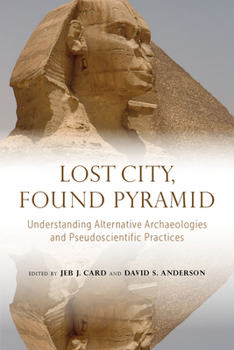Lost City, Found Pyramid: Understanding Alternative Archaeologies and Pseudoscientific Practices
Highly recommended." --CHOICE Lost City, Found Pyramid delves into the fascinating world of sensational "pseudoarchaeology," from perennial discoveries of lost pyramids or civilizations to contemporary ghost-hunting and reality TV. It examines how nonscientific pursuit of myths and legends warps both public perceptions of archaeology and of human history itself. A collection of twelve engaging and insightful essays, Lost City, Found Pyramid does far more than argue for the simple debunking of false archaeology. Rather, it brings into focus the value of understanding how and why pseudoarchaeology captures the public imagination. By comprehending pseudoarchaeology's appeal as a media product, cultural practice, and communication strategy, archaeologists can enhance and enliven how they communicate about real archaeology in the classroom and in the public arena. The first part of Lost City, Found Pyramid provides numerous case studies. Some examine the work of well-intentioned romantics who project onto actual archaeological data whimsical interpretative frameworks or quixotic "proofs" that confirm legends, such as that of the Lost White City of Honduras, or other alternative claims. Other case studies lay bare how false claims may inadvertently lead to the perpetuation of ethnic stereotypes, economic exploitation, political adventurism, and a misunderstanding of science. Offering much of interest to scholars and students of archaeology, archaeology buffs, as well as policy-makers involved in the discovery, curation, and care of archaeological sites and relics, Lost City, Found Pyramid provides an invaluable corrective and hopeful strategy for engaging the public's curiosity with the compelling world of archaeological discovery.
Format:Hardcover
Language:English
ISBN:0817319115
ISBN13:9780817319113
Release Date:September 2016
Publisher:University Alabama Press
Length:272 Pages
Weight:1.30 lbs.
Dimensions:1.1" x 6.2" x 9.1"
Customer Reviews
0 rating





